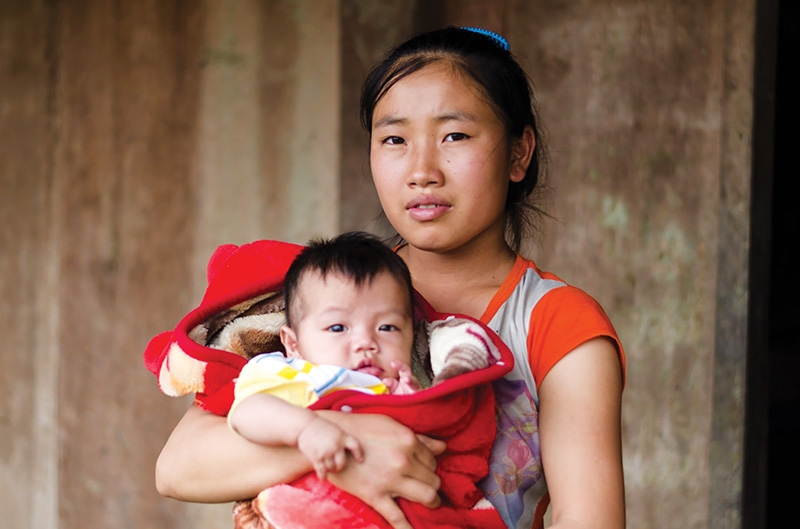Healthcare for the disadvantaged
 |
| The partnership helps those that live far from high-level hospitals |
At the Neonatal Intensive Care Unit (NICU) of Nghia Lo General Hospital, doctors are consistently providing active care for sick newborns, especially babies born prematurely to young mothers, the majority of whom are from ethnic minority groups.
As a common practice, ethnic minority women still have to carry out heavy farming work whilst receiving inadequate nutrition during their pregnancy. The consequence is that many infants are prematurely born.
As Dr. Nguyen Thi Ngoc Mai from the NICU explained, “Ethnic minority groups live in remote villages in mountainous areas which are hard to reach. It takes them hours to get to the NICU. As a result, many infants with infections come to our unit only in severe condition.”
In 2014 the NICU was established in order to take better care of these children in the hospital without requiring at least four hours to travel to the central hospital. At the time, Mai and many other physicians lacked both professional expertise and proper medical equipment to take care of the sick new-born babies.
To deal with this issue, GSK and Save the Children are cooperating to contribute to the development and operation of the NICU. Electrical equipment such as ventilators, automatic infusion machines, electric syringes, and monitors have been provided for the unit. In addition, 10 doctors and nurses have received training and practical experience at the National Children’s Hospital. With the support, Mai’s unit has helped save the lives of mothers and their babies from some of the most remote areas in the northern province of Yen Bai.
One of them was a H’Mong baby boy. Three years ago, he was born prematurely at 31 weeks at home in a remote village in Yen Bai. At one day old, the baby was brought to the NICU in critical condition, with bluish discolouration on his skin and severe infections. At that moment, no-one thought that he could make it, but with the wholehearted care of the doctors, he recovered miraculously and is now an active and healthy toddler.
Besides the support for Nghia Lo General Hospital, the cooperation between GSK and Save the Children has expanded to the village of Tram Tau, in Van Chan district of Yen Bai province. Hundreds of health staff, including midwives from the commune health centres, are receiving intensive training on birth delivery and handling common obstetrics-related problems, which allows nurses to help women at birth, as well as newborn resuscitation and safe referral in Nghia Lo General Hospital.
This means that many pregnant women do not need to travel long distances to higher level hospitals, but rather give birth safely at their local commune health centres.
The GSK and Save the Children partnership aims to save the lives of a million of the poorest children in the world, with the flagship community partnership programme supporting training and continuous medical education for healthcare professionals across many remote areas including Vietnam.
Science-led global healthcare GSK is continuing the establishment of a sustainable and accountable business in Vietnam, by setting the goal to offer innovative anti-infectives, respiratory medicines and life-course vaccine portfolio that supports healthcare professionals to prevent and treat for patient. Besides the Save the Children partnership, GSK also is committed to tackling global healthcare issues by working with the Medical Administration Department at the Ministry of Health and the British Embassy to Vietnam with an aim to support the Vietnamese government’s long-term strategy and align with the initiatives of the UK government to support developing countries.
Save the Children started its work in Vietnam in 1990 and has since expanded its programmes to cover education, health and nutrition, child protection and child poverty, disaster risk reduction, and also emergency response. It spans 22 cities and provinces across the country with offices in Hanoi, Haiphong, Lao Cai, Danang, and in Ho Chi Minh City.
What the stars mean:
★ Poor ★ ★ Promising ★★★ Good ★★★★ Very good ★★★★★ Exceptional
Themes: Healthcare Platform
- Hanoi intensifies airport monitoring amid Nipah disease risks
- Cosmetics rules set for overhaul under draft decree
- Policy obstacles being addressed in drug licensing and renewal
- Sanofi, Long Chau Pharmacy relaunch medicine blister pack collection initiative
- Takeda Vietnam awarded for ongoing support of Vietnam’s sustainability efforts
Related Contents
Latest News
More News
- Vietnam Television launches third 'Song Sau Lu' project for 2025 (December 15, 2025 | 08:00)
- Closing workshop highlights five-year impact of Fair for All project (December 12, 2025 | 16:22)
- Stakeholders mobilised before new child safety rules take effect (December 10, 2025 | 09:00)
- Vietnam receives emergency international relief as regional flooding intensifies (December 04, 2025 | 15:11)
- AmCham scholarships awarded to students (December 02, 2025 | 16:46)
- Vietjet flights carry love to devastated central region (November 28, 2025 | 11:35)
- SCG Sharing the Dream supports Vietnam’s youth and sustainable development goals (November 28, 2025 | 10:55)
- Siemens Caring Hands donates $34,700 for disaster relief in Vietnam (November 26, 2025 | 20:25)
- Ireland extends support for the Resilience First initiative (November 26, 2025 | 15:24)
- South Korea funds IOM relief for Vietnam’s typhoon-affected communities (November 24, 2025 | 15:33)

 Tag:
Tag:



















 Mobile Version
Mobile Version